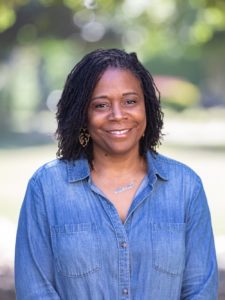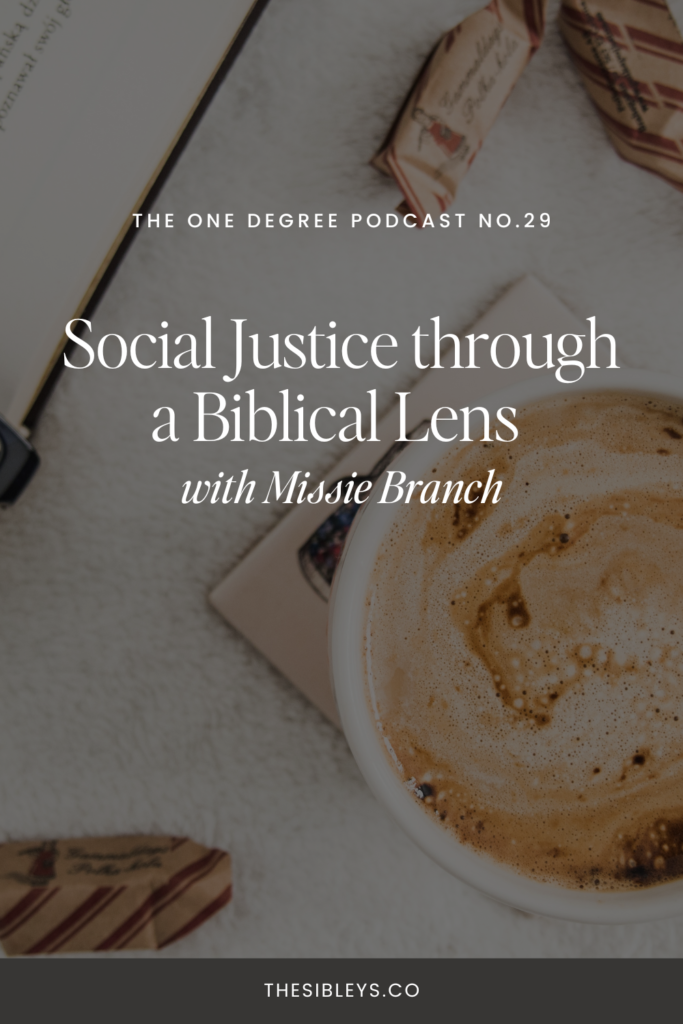This episode is so exciting because we have our first-ever guest on the podcast- Missie Branch! Missie is joining us to discuss the concept of social justice and how believers can view it through a biblical lens.

Missie Branch serves as Assistant Dean of Students to Women and Director of Graduate Life at Southeastern Baptist Theological Seminary in NC. She is also currently a student there completing her graduate degree in Ethics, Theology, and Culture. Missie is married to Duce Branch and together they have four children. Missie is a contributing author to The Whole Woman: Ministering to Her Heart, Soul, Mind, and Strength and the co-host of the Women & Work Podcast. Currently, Missie serves as the Chair of the Board of Trustees at Lifeway Christian Resources. Also, on a more personal note, Nathaniel had the immense privilege of being a co-worker of hers for four years while in North Carolina!
So what exactly is social justice and what does it have to do with the biblical concept of justice? How should believers interact with and enact social justice? What about when these issues are also part of heated political debates? We discuss all of these questions and more, so let’s dive in!
What is Social Justice?
Missie: As an ethics student, we talk about justice a lot, especially in this climate and country. But for the Christian, justice is really aligning ourselves to what God’s heart is. God is justice. So when we are talking about social justice (to be clear, I’m not talking about a social gospel or liberation theology), I’m talking about God himself and His laws and His desires. So social justice is a desire to see our society be realigned with God’s heart, laws, desires, and justice. A just system brings God glory.
Is there a difference between biblical justice and social justice?
Missie: At its base, you don’t have to be a Christian to be pursuing social justice- every person is pursuing some form of social justice. When coming from a human perspective, you realize that broken people are setting up broken systems- trying to achieve things. But what they achieve is done through brokenness and flawed views and skewed visions and biased opinions. Biblical justice is a reflection of God’s true heart. The idea of social justice looks different when it comes from God than when it comes from the heart of man.
As Christians specifically, how should we interpret social justice and interact with it?
Missie: It’s funny because when we look at how it’s happening in the United States, how the church interacts with social justice isn’t that different from how other people do. For the Christian, we look at more than if needs are being met and if people are being satisfied. Over time, in society, social justice has been completely tied to and boiled down to merely individual rights. But justice for society has to equal flourishing for all (including the individual). Christians need to ask, what does flourishing look like when God’s heart is being displayed and poured out throughout all of society? What does justice look like when everyone is realigned with God?
Missie: I once heard someone say that “justice on earth here in this broken state is elusive. We will never feel complete justice. But when the Lord returns, everyone will be satisfied.” Just imagine that! For the Christian, we anticipate what justice will eventually look like but currently working toward it because we understand God’s heart.
Is there a hierarchy of social justice issues?
For example, many Christians will say that fighting to end abortion is more important than foster care, or fighting for racial reconciliation is more important than caring for refugees. How do you explain this or answer someone who makes a hierarchy of social justice issues?
Missie: This is my opinion, and I am not claiming to be God. But I would not place a hierarchy on justices. God isn’t saying that he cares more about a certain group of people being taken care of versus another. However, there are varying degrees of severity of consequences or ripple effects. God isn’t going to look at the refugee who is fleeing persecution and say that there is something else more important, so He’ll deal with them next week. As finite people, we can’t put our attention everywhere, so different people will place their attention on different issues. This allows us as one body to meet all the needs, but we don’t need to weigh them out in a hierarchy. There are also some issues that are pressing or need to be dealt with more immediately, but we shouldn’t use the term “hierarchy.”
Those convictions that different people have are God-given! We aren’t all called to focus on merely one specific issue, but when all believers work together, the body of believers can meet all needs. “Many hands make light work.”
How should Christians think about hot-button political issues from a biblical perspective?
So many issues are tied up with politics such as racial reconciliation and climate change. How should Christians approach them from a biblical perspective?
Missie: We need to ask ourselves “what does God want?” What does he state clearly to us so we can go and act accordingly? What things aren’t clear, but we need others’ help so we can go out and do it? As broken humans, we tend to just react, which causes a lot of ripple effects. But seeking the Lord’s heart on this, we ask what it looks like to consider these issues.
Missie: When it comes to the climate… We are stewards of this planet, so what does it look like to steward it well? What choices can we make as individuals, small, and large communities to steward the earth well? When it comes to racial reconciliation, the globe is full of multiple races and ethnicities, so this isn’t a singular conversation. How am I loving people around the world in a way that reflects God’s love for them and reflects the dignity that God has given them?
Two Camps
It seems like there are two camps: one camp that is living justice out well but has a warped theology. The other camp has solid theology, but sweeps issues under the rug or doesn’t put its theology into action. How would you respond to that?
Missie: It’s important to realize we can’t do many things alone. We can’t grow spiritually alone, we don’t have full sight of God’s heart alone. We need each other. The person who is rich in theology, but poor in practice, needs that person who can show them how to tangibly represent Christ. That person may not realize it, but this looks like Jesus. The person who represents Christ so well, but is weaker in their theological grid, needs the person who knows the Bible inside and out. It’s okay to admit that there are people who know how to do, but don’t necessarily know and that there are those who know, but don’t do. When we come together, we model a better picture of social justice.
Missie: Think about Jesus and His disciples! Jesus could have picked and sent out only one disciple. But he picked twelve different guys who had different backgrounds and skills and were going to share and spread the gospel in different ways! We need all of them to be able to see ourselves reflected in Jesus Christ.

The Responsibility of Christians
Nathaniel loves to read the Minor Prophets and one that he read through recently is Amos. In Amos 4, he condemns the rich women of Israel. Not for directly oppressing others, but for being complicit in the oppression of others. They tell their husbands to bring wine to drink while they knew the wine was obtained through oppression. What responsibility does a Christian have to ensure they are not complicit in the oppression of others?

Missie: If you read the Bible, there are around 30 times that it talks about unjust scales and God’s hatred for them. God is making something clear to us. The idea that we would (either knowingly or unknowingly) allow for another image bearer to have their dignity marred or their value questioned is reprehensible to the Lord. We don’t have an excuse for it.
Missie: I have a friend who will not buy from certain companies because, in their production, they are harming children or targeting women and trafficking. There is a complicity that all of us have no clue about. There are other ways in which our complicity is obvious and it would be difficult to make decisions likewise. We are going to be held responsible for them. It would behoove us to remember that we will stand before the Lord to account for the big and the small things.
Missie: I tell my children all the time: “Remember the way you feel in your lowest moments. Make it your practice to never let anyone feel that way at your hands.” When we see people as our brothers and sisters and children, as the Lord’s creation, we gain a better perspective. We cannot allow someone else to suffer for our own excess or greed or comfort, etc…
Where to Start
So for the person who has grown up in a bubble and social justice is a new topic for them, how can they get involved? How can they fight for justice and help reconcile injustices that they see around them?
Missie: We don’t have to take on a “God complex.” God isn’t making any one person responsible for the ills of the world. We don’t have to own all the sins of the past. Shame and guilt are not from the Lord, so when we go to that extreme, we don’t allow the Lord to do what He wants to do. Which is to align us back to Him, to soften our hearts to others and their needs. The Lord is waiting for us to learn how to listen to the Holy Spirit and to move and act in community in ways that bring Him glory. When our eyes are opened to the injustices around us, we need to remember:
- The hurdles that people have to jump in order to get where they are. If you are already aware of a social justice issue, but someone else is just now learning about it, recognize that the Lord is walking them through a journey.
- We have to be willing to take the journey with others. One-sided conversations are unhealthy and unsafe.
Suffocated by Injustice
With social media and the immediacy of information, we are inundated with news of injustices and issues happening all over the world daily. We see so much more of the magnitude of injustice because of how connected we are. What wisdom would you give to the person who feels suffocated?
Missie: People will respond differently. For the empath, it can be overwhelming. For people who have seen so much, they can easily become apathetic and unaffected. It comes back to being prayerful. Also, remember that communities are not monoliths. The Lord has created different people in communities to do different things. Some are warriors who will go out and fight for causes. And there are some people who are supposed to be in the background offering care and support. They may not have what it takes to be on the front lines and that’s okay! When we expect everyone to play the same role, the people who aren’t built for that role get worn down. It is the responsibility of the community to care for those who feel weighted and overwhelmed.
Missie: Figure out what small things you can do- pray, donate, send missionaries, sponsor a family. There are things you can do- seek the Lord on how you can make an impact. Like the concept of “One Degree,” one person doing one thing multiplied does equal big change.
Justice Outside of the Comfort Zone
It can be so easy to function in an echo chamber. You brought up the importance of listening to those who may disagree with you or have a different perspective. How do we find the people who may have different perspectives from us and listen well when we find them?
Missie: We need to be secure in what we believe- in our Christianity. We may have to go outside of our comfort zone and our bubble, but in confidence as a believer. You can speak the truth as a believer into some issues. We also need to be intentional to listen to other voices. One group of people should not be the only one talking, another listening, and another the stenographers. We need to have conversations that all of us can be a part of. But we need to be willing to actually hear each other.
One Degree Shift
Missie: I grew up with a mom who prayed about everything. The way prayer transformed her life has changed me. So I would challenge people to devote time to praying for people who are different than them and for opportunities to be around them.
For example, every Monday, I am going to pray for communities that are different from mine. Ask the Lord, “show me how we can intersect and how I can reflect you and show them your heart.”
Take time to be prayerful!
Want to Stay a Little Longer?
- Listen to these other episodes on knowing what you believe, how to read your Bible, and finding Godly community
- Download this guide to get started on going deeper into reading your Bible!
- Subscribe to our weekly newsletter, we deliver one theological thought (among other things), once a week
- Follow along on Instagram for even more education, news, and fun!

+ show Comments
- Hide Comments
add a comment